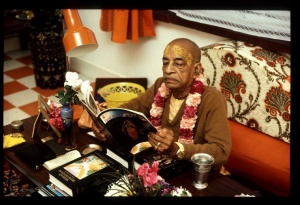741003 - Lecture Bengali - Mayapur

A.C. Bhaktivedanta Swami Prabhupada
(Translated from Bengali)
Prabhupāda:
- notpādayed yadi ratiṁ
- śrama eva hi kevalam
- (Śrīmad-Bhāgavatam 1.2.8)
All of you are coming here, and listening to narrations about Kṛṣṇa's pastimes, this is very auspicious. If one takes this subject matter enthusiastically, and thinks that "There's going on narrations about Kṛṣṇa's pastimes. Let me go and listen." The ones who are intelligent, are thinking like this..it is very auspicious for them. And the ones who are thinking,"Some nonsense talk is going on..let them talk..we have work . . . bigger matters to attend to," they are not intelligent. They are thinking themselves to be hard-working, very important people, dharmaḥ svanuṣṭhitaḥ (Śrīmad-Bhāgavatam 1.2.8), "I have farming etc. to do, it doesn't matter if I don't go. What will happen by listening to these narrations of the Supreme Lord's pastimes?"
So, you're doing good work . . . or doing some other work . . . you have a factory . . . you may have all these things. Or you may be a learned person who knows who knows who the Supreme Person is, doing deity worship, studying Vedic scriptures. However, even after doing all this, if one does not develop taste for the narrations of the Supreme Person's pastimes, that "Here, there's a talk about Bhagavān, the Supreme Person, let me listen," the scriptures says "notpādayed yadi ratiṁ", that if there is no ratiṁ, if there is no ratiṁ matiṁ for such subject matter . . . ratiṁ-matiṁ.
Golokera prema-dhana hari-nāma-saṅkīrtana rati nā hoilo kene tāy (Hari Hari Biphale Janama Goṅāinu by Śrīla Narottama dāsa Ṭhākura)
Narottama dāsa Ṭhākura is saying: "This is process is from Goloka. It is not a mundane thing, Hari-nāma-saṅkīrtana. Even then, it has not lead to me to divine attraction or consciousness."
Golokera prema-dhana hari-nāma-saṅkīrtana
This chanting of the Supreme Person's Holy Names is not like ordinary song and dance. Many people sing and dance. If people think that this too is like the ordinary song and dance, then the person is an ass. Narottama dāsa Ṭhākura is saying that this is not like the mundane song and dance, this is "Golokera prema-dhana". Kṛṣṇa is transcendental to material creation. Transcendental to material nature is Kṛṣṇa. Just like that, His name, qualities, pastimes, activities, everything is transcendental. Are these separate from Kṛṣṇa? No. These are all from Goloka. That is why Narottama dāsa Ṭhākura is saying:
Golokera prema-dhana hari-nāma-saṅkīrtana Rati nā janmilo kene tāy saṁsāra-viṣānale dibā-niśi hiyā jvale juṛāite nā koinu upāy
In this material existence, there are calamities. Only calamities. No matter how well you live, no matter how carefully you live, calamities will arise. That is why viṣānale is stated. Or dāvānale. All things are stated in the scriptures.
- saṁsāra-dāvānala-līḍha-loka-
- trāṇāya kāruṇya-ghanāghanatvam
- (Gurv-aṣṭaka, Śrīla Viśvanātha Cakravartī Ṭhākura)
Here, fire is bound to ignite. No matter how carefully one stays, calamities are going to be there. That's why, the Vaiṣṇavas always say,
saṁsāra-dāvānale viṣaya-viṣānale dibā-niśi hiyā jvale juṛāite nā koinu upāy Golokera prema-dhana hari-nāma-saṅkīrtana Rati nā janmilo kene tāy
All these things are stated in all the scriptures, stated in words by the mahājanas . . . for us perform chanting of the Supreme Person's Holy Names , listen to narrations of the pastimes of the Supreme Person . . . this is our main duty. After that, there's maintenance of the body . . . to maintain the body, all that is necessary must be related to Kṛṣṇa. First, we have to establish and keep our real relationship with Kṛṣṇa in the center, and then the rest of our work may be done. While performing all other work,
- nirbandhaḥ Kṛṣṇa-sambandhe
- yuktaṁ vairāgyam ucyate
- (Bhakti-rasāmṛta-sindhu 1.2.255)
The Gosvāmīs have stated, that our real relationship is with Kṛṣṇa. Just as, when someone in order to fulfill their life's duties, is perhaps doing some menial work. What else will they do? They have to do so because of needs, the need money for their children. Why does the person do this kind of menial work? Due to the relationship with the children. They may not desire to perform such menial work, but they are compelled to. Just like that, in this catastrophic world, many times we are compelled to work that we may not want to, but . . ."kāmādīnāṁ kati na katidhā pālitā durnideśāḥ . . ." (Bhakti-rasāmṛta-sindhu 3.2.35) people are bound to do this. However, if we keep a good relationship with Kṛṣṇa then there's no fear of calamities. Otherwise, it is full of fear. (end)
- 1974 - Lectures
- 1974 - Lectures and Conversations
- 1974 - Lectures, Conversations and Letters
- 1974-10 - Lectures, Conversations and Letters
- Lectures - India
- Lectures - India, Mayapur
- Lectures, Conversations and Letters - India
- Lectures, Conversations and Letters - India, Mayapur
- Lectures - General
- Audio Files 05.01 to 10.00 Minutes
- 1974 - New Audio - Released in October 2014
- Lectures and Conversations - Bengali
- Lectures and Conversations - Bengali Translated
- 1974 - New Transcriptions - Released in October 2014